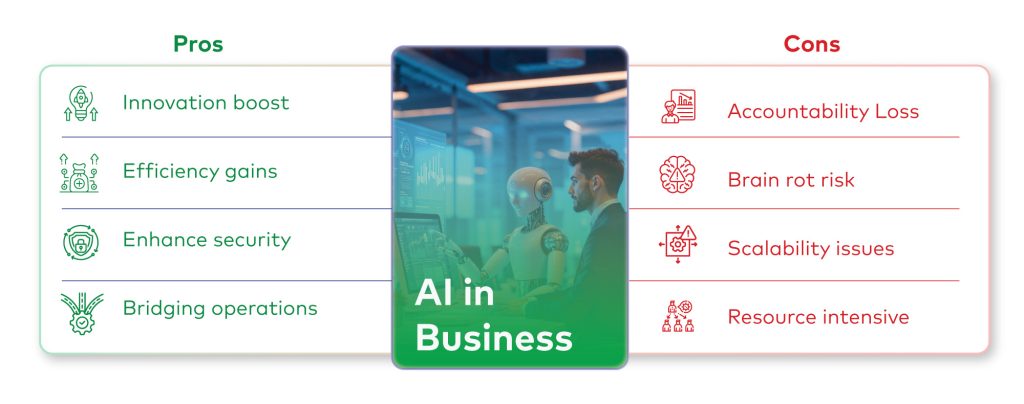
Last updated on October 13, 2025
AI Is Changing Software Development — Are You Ready?
Summary
AI is transforming software development, shifting focus from traditional coding to intelligence-driven automation. From streamlining legacy modernization to building AI-native applications, enterprises must embrace AI as a strategic partner. Consulting firms like Blanco play a key role in guiding this transformation, balancing automation, governance, and upskilling. As AI reshapes roles, processes, and architecture, the future belongs to those who are ready to lead with agility, responsibility, and innovation.
AI is rapidly changing the way we work, consume information, search for answers, and automate tasks, particularly the aspects of our lives that require thinking and writing. Very soon, it will become an inseparable part of our lives. Already, many are using AI tools, instead of regular search engines, to find answers to their everyday questions, writing emails and other communications, making plans, etc. However, the use cases are largely for individuals – employees use it in their work to make it faster and reduce mental load, or general people in their day-to-day lives. We are yet to see reliable and successful AI enterprise software, though it may not be long before they flood the markets, each presenting their competitive advantage over others. Despite great advancements and companies advertising AI tools every day, even the near future is largely unpredictable. So, how and what should enterprises prepare themselves for? How is this changing software development that underpins the growth of modern enterprises in any domain?
The Shift from Code-Centric to Intelligence-Centric Development
A couple of months ago, a text image went viral – It said, “I want AI to do chores like washing dishes, instead of making art”. AI adopters counter it with real stories of how AI improves work satisfaction and work-life balance. AI tools can’t do our dishes (yet); however, AI developer tools can automate or streamline mundane and repetitive aspects of project management.
AI is shifting the paradigm of software development from being purely code-centric to intelligence-centric. Traditional development involved long cycles of requirements gathering, architecture planning, coding, and testing. With AI, many of these steps are now either partially or fully automated. Generative and predictive AI models can suggest code, flag bugs, recommend performance optimizations, and even create test cases — dramatically speeding up time to market and reducing workload.
The implications for enterprise IT teams are profound. Teams are leveraging public AI tools and LLMs available for free at a nominal price. But interconnected enterprise products and platforms with AI components do require big investments and fall-back plans with several AI agents for better reliability. Despite the concerns, the digital landscape is quite excited about AI developments. Consulting firms like McKinsey report that employing a multi-agent generative AI approach for modernization of legacy IT systems delivers about 40% acceleration in timeline, 40% reduction in cost, and consistent code quality and faster reverse engineering of legacy logic.
Embracing AI-Native Applications
Enterprises are no longer just consumers of AI; they are growing AI-first and becoming builders of AI-native applications. These are systems designed from the ground up to leverage AI
foundation models as core components — not just bolt-ons. Think AI-driven customer service, predictive analytics, autonomous operations, and intelligent compliance tools.
Yet building these systems requires more than just adding LLMs to an app. It requires rethinking architecture, governance, data strategy, and user experience. This is where experienced consulting firms bring tangible value. They can assess AI readiness, integrate APIs, ensure responsible AI use, and establish human-in-the-loop design for reliability and safety.
Organizational Impact and Cultural Shift
The integration of AI into software development is not just technological; it’s deeply organizational. Companies must deal with questions such as:
- How do we balance automation with human oversight?
- What roles will developers, testers, and product owners play in an AI-first environment?
- How can we increase accountability and ensure security?
- How do we upskill teams to understand and work alongside AI?
For instance, in Iraq, a regional telecom provider recently began implementing AI to monitor and optimize its network infrastructure. With the help of a consulting partner, they trained their engineers in prompt engineering and MLOps, allowing their teams to take ownership of AI workflows rather than relying entirely on external vendors. As a result, outages were reduced by 30%, and customer satisfaction scores improved significantly.
The Role of Consulting Firms in Navigating the AI Shift
While the hype around AI is enormous, the real value lies in practical, strategic implementation. This is where consulting firms offer their most critical advantage:
- Expertise across industries: Consulting partners have seen how AI is applied in healthcare, finance, manufacturing, and telecom. They can cross-pollinate insights.
- Tailored strategy: Every enterprise is different. A good partner helps prioritize initiatives, identify low-hanging fruit, and set realistic KPIs.
- Technical depth: From integrating foundation models to building secure, scalable data pipelines, consulting firms provide the technical grounding necessary for AI success.
- Change management: AI doesn’t just change codebases — it changes people, processes, and mindsets. Consulting firms help enterprises manage this transition effectively.
The Rise of Generalists
The digital ecosystem is awaiting further advancements in AI, such as Artificial General Intelligence (AGI). Now is the time to think about what general intelligence means in humans. At least in the domain of software development, it refers to knowledge of the software business landscape, a general understanding of digital technologies, and the ability to use AI tools to drive efficiency while still holding accountability. However, despite general intelligence in AI and humans, expertise in the industry is still very important.
With AI tools, everyone is now more capable. Developers can also be designers. Business experts can venture confidently into the IT domain. AI now offers us a great degree of freedom and a great responsibility that is imperative. Though everyone (and every country) is busy competing with others to win the tech race, long-term winners are those who understand the cons of AI along with its pros.
Though we commonly use AI tools to generate content, they have become indispensable in brainstorming, providing a good balance between speed and accuracy. It helps with faster operations, better security, and bridges the gap between IT and business teams.
Its wide adoption at an unprecedented speed, does speak about its usefulness in generic situations.
Despite the usefulness, over-reliance on AI is not very good. The concerns are quite valid. It does hallucinate and is not very reliable in critical contexts. It is currently very resource-heavy and hence not very scalable unless the technology advances to consume fewer or alternate resources. Also, AI has created an environment where everyone should be responsible for everything. The shifting between diverse tasks increases mental load and is very taxing for employees. Disparate and unintegrated AI add-ons can’t make operations easier and smoother for employees. We need more holistic AI-backed software solutions that are reliable even at the enterprise level.

Preparing for an AI-Augmented Future
Enterprises must begin viewing AI not as a threat to jobs or as a trendy tool, but as a partner in transformation. The future of software development will be less about writing every line of code and more about orchestrating intelligence — human and artificial — to build faster, better, and more efficient systems. Software development would also mean customizing AI tools for specific use cases, critical domains, and increasing its accuracy and reliability.
In the current business context where technologies are changing rapidly and in unexpected ways, partnering with experienced consulting firms is no longer optional; it’s a strategic necessity. They bring the technical knowledge, cross-industry experience, and organizational maturity required to navigate complex transitions.
The question is no longer if AI will change software development — it already has. The question is: are you ready to lead in this new era? If you are, we’re here to support you.






